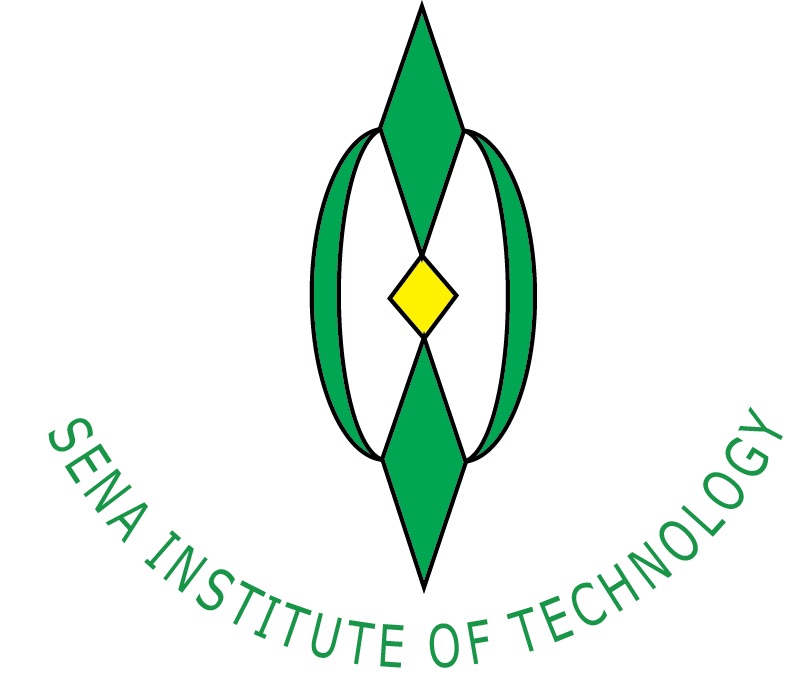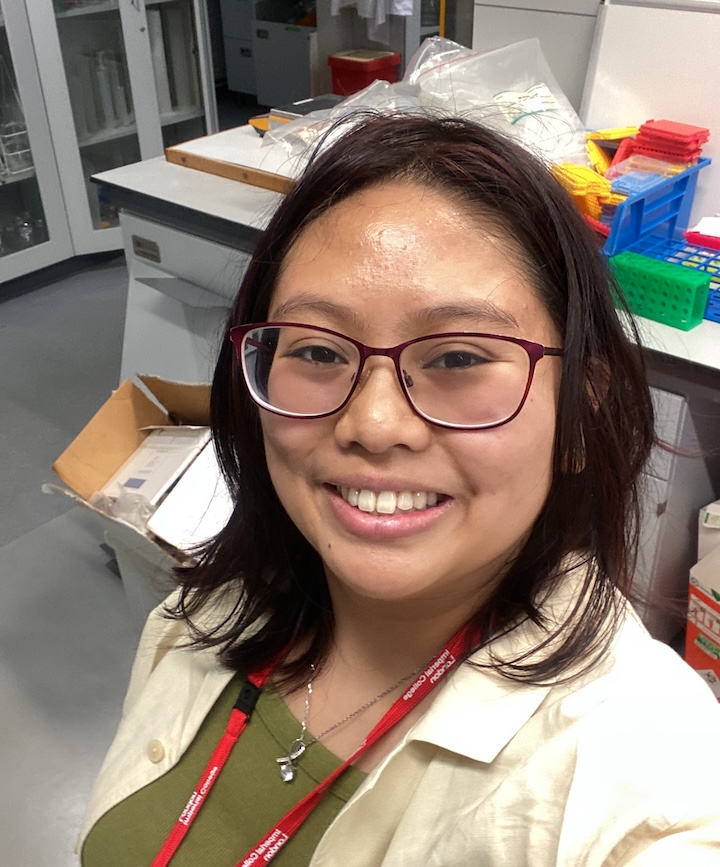
Sena Captains Series
Meet Roxanne Sicat – SIT intern since 2022
Roxanne has been a volunteer at the Sena Institute of Technology (SIT) since 2022. As well as preparing grant applications to support SIT’s educational and scientific activities, she has assisted with planning workshops and has written articles promoting SIT’s activities in Ghana and Boston.
Roxanne is currently an MRes Molecular Plant and Microbial Sciences student at Imperial College London, focusing on the plant immune system under the supervision of Dr Jiorgos Kourelis. She is deeply passionate about both engineering durable resistance to plant pathogens in crop plants, and how optimizing beneficial symbioses between crops and microbes can drive reductions in mineral fertilizer use. In addition, as a Filipino plant scientist who has lived in a range of Southeast Asian countries, (Vietnam, Thailand, Indonesia, and Singapore) Roxanne is enthusiastic about the role that plant sciences can play in advancing food systems in the Global South.
Given her roots in the Global South, Roxanne understands that unlocking the potential of scientific research in Africa is vital to supporting African nations’ transitions into advanced economies. By educating the next generation of African scientists; by forging collaborations between African scientists from across the continent and beyond; and by pioneering cutting-edge research that puts the needs and perspectives African nations at the center of scientific inquiry, Roxanne believes that SIT is poised to play a major role in revolutionizing how science is done in Africa.
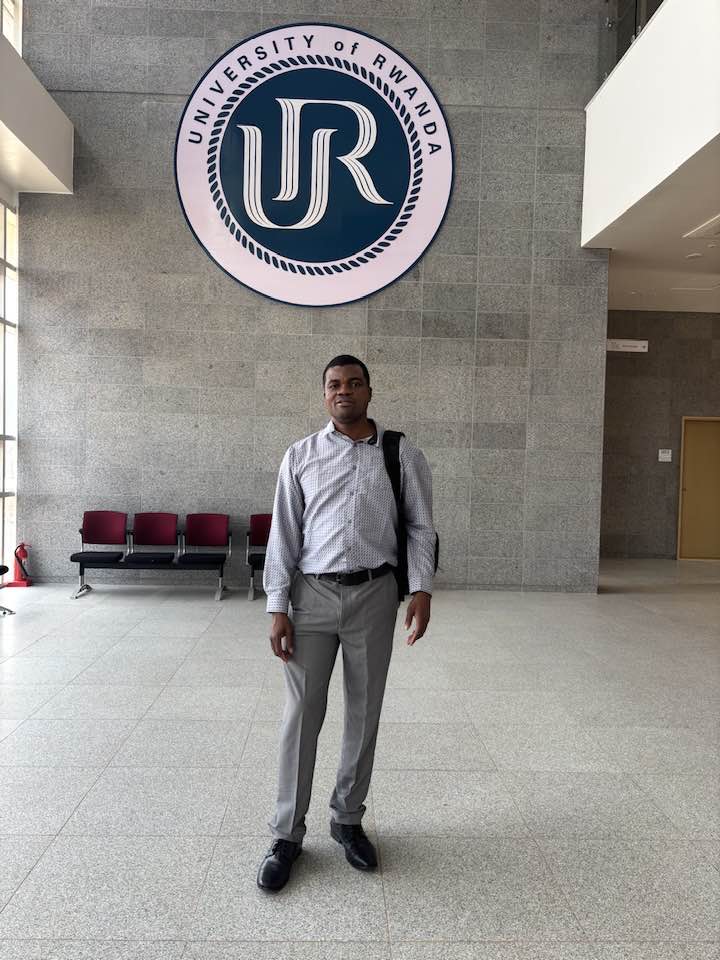
Building Biotech Capacity in Africa: Dr. Agbleke Trains Graduate Students at University of Rwanda
Kigali, Rwanda (July 2025) — In a significant step toward strengthening Africa’s biotechnology ecosystem, Dr. Kwasi Agbleke, Co-founder and President of Sena Institute of Technology and a leading advocate for African-led science, served as a guest instructor in the Master’s in Biotechnology program at the University of Rwanda.
The course, part of the university’s advanced biotechnology curriculum, was designed to equip graduate students with hands-on skills in modern biotechnological methods. Dr. Agbleke’s module focused on emerging technologies, their real-world applications, and the entrepreneurial pathways available to students passionate about launching biotechnology ventures across the continent.
“Africa has the talent and the scientific challenges. What we need are platforms that connect the two,” said Dr. Agbleke during the workshop series.
Topics Covered:
- New frontiers in molecular diagnostics
- Synthetic biology and bioengineering
- Translational research pathways for African health and agriculture
- Business models for biotech startups
- Funding and incubation strategies across the continent
Student Impact:
The training provided students with both technical and entrepreneurial insights, encouraging them to think not only as researchers, but as future biotech innovators ready to address challenges in health, agriculture, and sustainability.
This collaboration highlights the importance of academic-industry partnerships in building a robust African biotech pipeline.
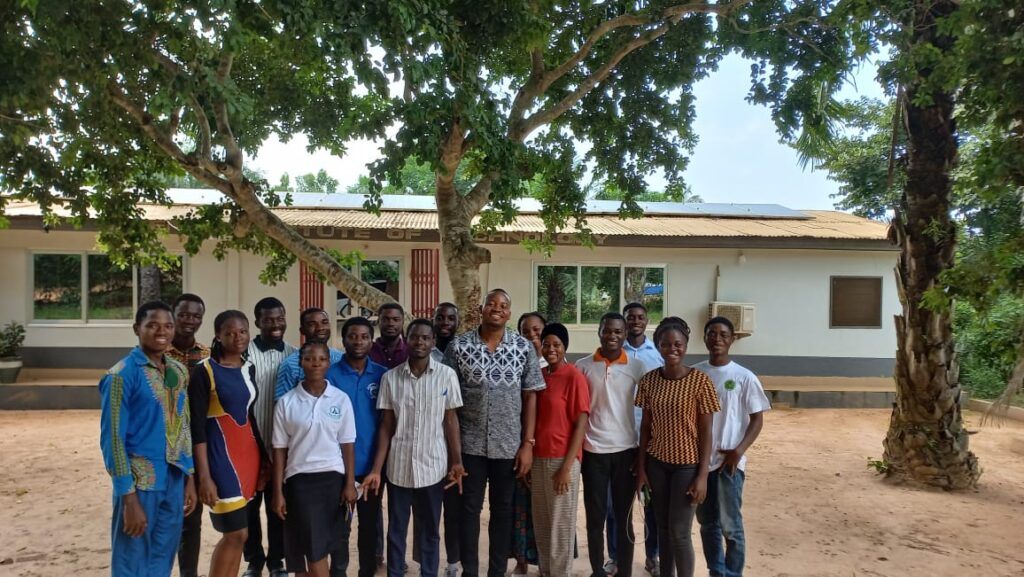
SIT Hosts Its Second Internship Program with Students from University for Development Studies
June 2025 – The Sena Institute of Technology (SIT) is excited to welcome the second cohort of interns from the University for Development Studies (UDS) as part of our growing partnership to train the next generation of scientists in Ghana.
This internship program is designed to provide hands-on experience in molecular biology, biodiversity research, conservation genomics, and laboratory techniques—all essential tools for a future-ready career in science and innovation.
Real-World Experience for Future Scientists
The interns will be actively engaged in ongoing projects such as:
- DNA barcoding and species identification
- Conservation mapping of plants and marine organisms in Ghana
- Molecular biology and microscopy in lab-based research
- Cell culture and disease research, including fibroid genetics
- STEM education support for local high schools and undergraduates
This practical exposure complements their university coursework and provides opportunities to work alongside experienced scientists and research mentors.
“We are proud to collaborate with UDS to help shape the future of life sciences in Ghana,” said Mr. Michael Agbleke, Director of SIT.
“Our goal is to build a strong scientific workforce that can lead biotech innovation across Africa.”
Growing Partnerships for Science Education
This internship reflects SIT’s commitment to capacity building in higher education by creating meaningful academic partnerships and opening access to advanced training and research.
We thank the leadership of the University for Development Studies and all our partners who continue to support science education and career development in Ghana.
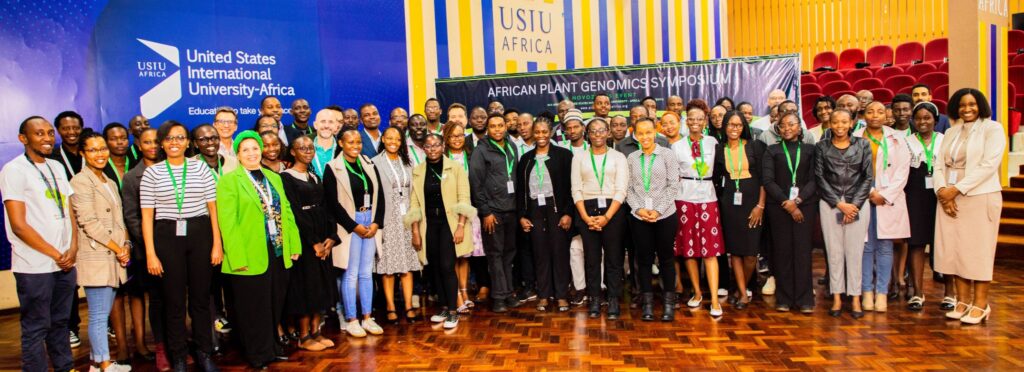
Dr. Agbleke Shares Insights on Plant Development at African Plant Genomics Symposium
Nairobi, Kenya (April 2025) — At the forefront of plant science innovation, Dr. Kwasi Agbleke, President of the Sena Institute of Technology, delivered a featured talk at the African Plant Genome Symposium, held recently in Nairobi.
His presentation focused on the institute’s cutting-edge research in plant evolutionary development (evo-devo)—an area critical to understanding how plants adapt and optimize their growth across diverse environments.
“To improve crops, we must first understand how plants evolve and prepare for flowering,” said Dr. Agbleke during his presentation.
Research Highlights:
Dr. Agbleke shared ongoing work at the Sena Institute exploring:
- Key genetic pathways regulating vegetative growth
- Developmental stages leading up to flowering initiation
- Implications for agricultural innovation, including crop timing, yield optimization, and resilience
The work reflects Sena Institute’s broader mission to strengthen African-led plant genomics research that supports sustainable agriculture and food security.
Why This Matters:
Understanding how plants develop and transition to flowering is vital in the face of climate change. It enables scientists to breed crops that are not only more resilient, but also more productive and better suited to local ecosystems.
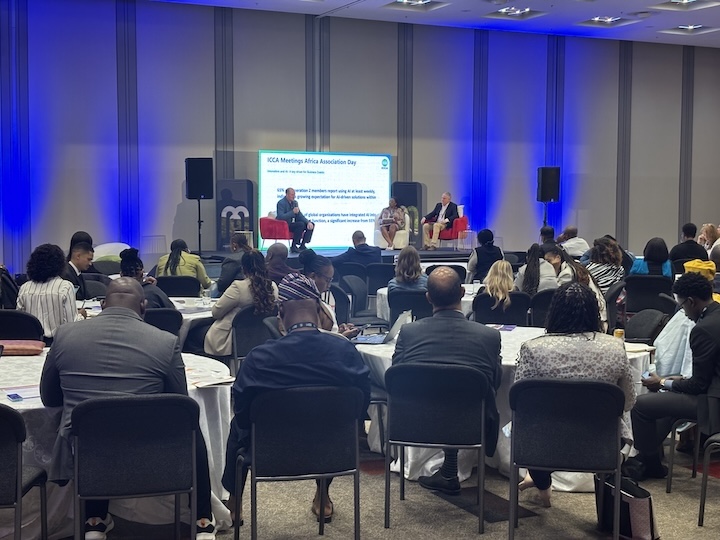
Dr. Agbleke Advocates for Scientific Access at Meetings Africa 2025
Johannesburg, South Africa — In February 2025, Dr. Kwasi Agbleke, President of the Sena Institute of Technology (SIT), participated in Meetings Africa, a premier platform showcasing Africa’s business events industry. Dr. Agbleke joined thought leaders to highlight a critical yet underrepresented topic: expanding access to scientific conferences across the African continent.
“Science thrives in communities that share ideas, collaborate openly, and learn together. Africa deserves a greater platform in this global exchange,” said Dr. Agbleke.
Why It Matters:
Scientific meetings are not just events—they are catalysts for innovation, mentorship, and technology transfer. Yet, many African researchers face barriers to participation due to high costs, visa restrictions, and lack of local hosting opportunities.
At the conference, Dr. Agbleke called for:
- More African-hosted scientific meetings
- Strategic partnerships with global research societies
- Funding mechanisms to support African scientists’ travel and participation
SIT–FASEB Conference in South africa
A major highlight of the event was the announcement of a new partnership between Sena Institute of Technology (SIT) and the Federation of American Societies for Experimental Biology (FASEB).
Together, they will co-host the second FASEB conference on African soil in South Africa—a milestone that signals a broader shift toward decentralizing scientific convenings and amplifying African voices in global research.
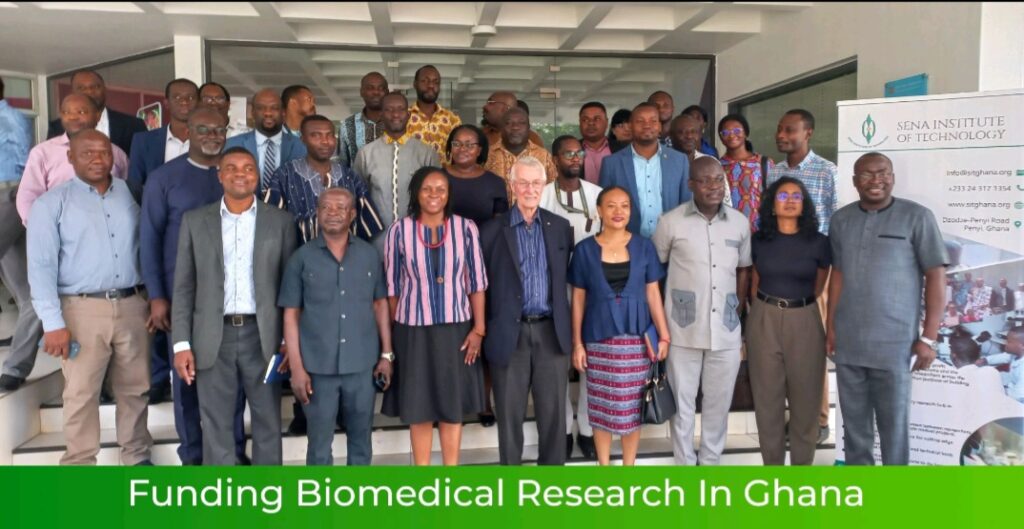
SIT Convenes Stakeholder Meeting at the British Council, Accra
Special Guest: Dr. Rich Roberts, 1993 Nobel Laureate in Physiology or Medicine
The Sena Institute of Technology (SIT) recently convened a landmark stakeholder meeting at the British Council in Accra, bringing together leaders in science, education, and policy to chart a transformative path for biotechnology in Ghana. We were deeply honored to host Dr. Rich Roberts, 1993 Nobel Laureate and Chief Scientific Officer of New England Biolabs, as a distinguished guest.
Key Observations and Calls to Action
The meeting underscored a shared commitment to unlocking the potential of biotechnology in Ghana and across Africa. Several key insights emerged:
1. Biotech Drives Medical and Scientific Progress
Biotechnological research has underpinned some of the most groundbreaking advances in health, medicine, and technology. Yet, despite remarkable breakthroughs in genomics, physiology, imaging, immunotherapy, food science, and environmental health, many promising research projects remain underfunded or delayed due to financial constraints.
“We have the ideas. What’s missing is the consistent support to turn them into impact,” noted one speaker.
2. A Strong Case for Increased Funding
The group emphasized that sustainable investment in local research is critical for Ghana’s innovation future. Unlocking funding from both public and private sources could accelerate discoveries, strengthen health systems, and boost economic growth through biotech innovation.
Education Reform for Innovation
A strong theme emerged around revamping education to cultivate innovation and interdisciplinary thinking:
- Student-Centered Curriculum: Participants advocated for delayed specialization in the sciences, allowing students to explore multiple disciplines before narrowing their focus. This cross-pollination of ideas is expected to spark creativity and broader problem-solving capacity.
- Hands-On Practical Training: Attendees agreed that real-world experience must be built into university programs through laboratory training, research internships, and fieldwork.
“To lead in biotech, we must teach students to think like innovators, not just memorise content,” said Dr. Rich Roberts, CSO of New England Biolabs.
Toward a National Research Agenda
The event concluded with a call to establish a national strategy for supporting biotechnology research—backed by universities, philanthropies, industry leaders, and government agencies.
SIT is committed to playing a central role in convening experts, mentoring students, and creating a pan-African biotech ecosystem focused on health, food security, and environmental resilience.
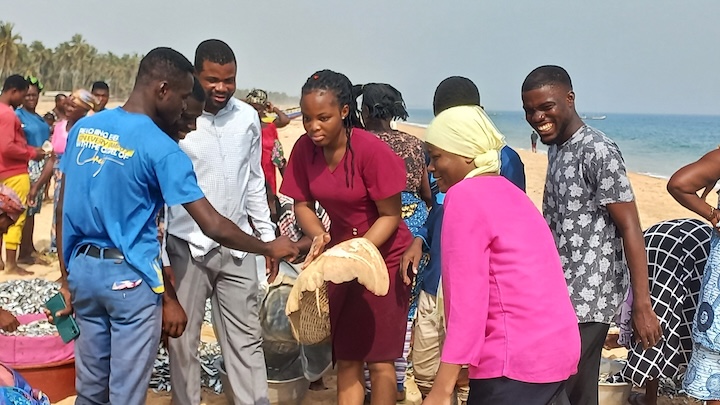
Sena Institute Partners with Ocean Genome Legacy to Explore Marine Biodiversity in Ghana
Acrra, Ghana – We are thrilled to announce a groundbreaking partnership between the Sena Institute of Technology (SIT) and the Ocean Genome Legacy Center at Northeastern University (OGL) to launch a new initiative focused on sampling and sequencing marine biodiversity across Ghana’s coastal ecosystems.
This collaborative project will help uncover the rich yet understudied biodiversity of Ghana’s marine environments, providing vital data to inform conservation efforts and strengthen scientific capacity in the region.
“This partnership will not only advance research but also help safeguard marine genetic resources for future generations,” said Mr. Michael Agbleke, President of SIT.
What the Project Will Do:
- Sample and sequence marine organisms along the Ghanaian coastline
- Generate a genetic map of regional marine biodiversity
- Contribute to the global understanding of species richness, population health, and ecosystem dynamics
Building Africa’s Biodiversity Knowledge Base
All materials and genomic data collected will be deposited in the SIT Sub-Saharan African Genome Repository—a key regional resource to support:
- Future research and comparative genomics
- Educational training in genetics and conservation biology
- Policy-making for biodiversity protection
Training the Next Generation
As part of the partnership, SIT will provide hands-on training opportunities for students and early-career scientists in molecular biology, field ecology, and bioinformatics, helping build the next generation of African conservation leaders.
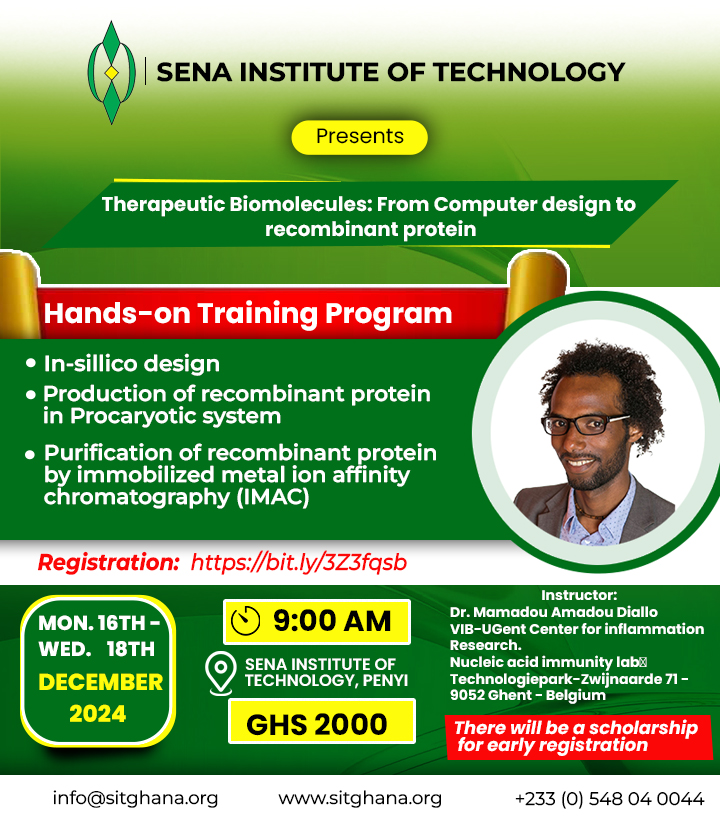
SIT Launches “Host-an-Expert” Program to Drive Biotech Innovation in Ghana
Penyi, Ghana (November 2024) – As part of its mission to foster homegrown scientific advancement, the Sena Institute of Technology (SIT) is proud to announce the launch of its new “Host-an-Expert” Program — a pioneering initiative designed to bring global biotechnology expertise directly into the heart of Ghana.
“We believe that sustained access to international expertise can accelerate knowledge transfer and catalyze innovation locally,” said Mr. Michael Agbleke, Director of SIT.
What Is the “Host-an-Expert” Program?
This initiative invites leading scientists, innovators, entrepreneurs, and educators from around the world to spend short-term residencies at SIT, collaborating on:
- Cutting-edge research projects
- Capacity-building workshops
- Joint publications and grant writing
- Mentorship for students and early-career researchers
Experts will engage directly with local staff and students in biotechnology, genomics, diagnostics, marine biology, agricultural innovation, and more.
Program Objectives
- Knowledge Exchange: Bridge the gap between African scientists and global biotechnology leaders.
- Innovation Acceleration: Spark joint research projects with high translational potential.
- Skill Development: Enhance local research capacity through mentorship and technical training.
- Sustainable Impact: Strengthen Ghana’s biotech ecosystem through long-term collaborations.
Get Involved
SIT is currently inviting:
- International researchers to apply as visiting experts
- Ghanaian institutions to co-host events and training
- Funders and partners to support expert fellowships and housing
Contact: info@sitghana.org
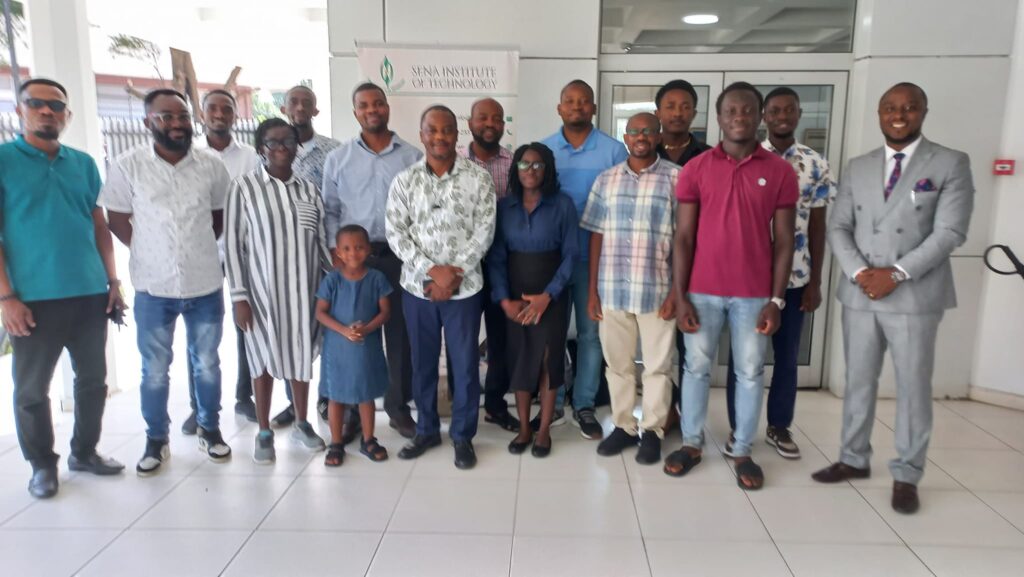
Wrapping Up: DNA Barcoding & Bioinformatics Workshop at SIT
September 2024 – As we say goodbye to the incredible participants of the Second DNA Barcoding Workshop at the Sena Institute of Technology (SIT), we’re filled with pride and excitement for the journey ahead in molecular biodiversity research.
Over the course of the workshop, participants—educators, researchers, and students—gained hands-on experience in bioinformatics and species identification using cutting-edge tools and datasets.
Workshop Highlights
The focus of this session was on bioinformatics for biodiversity, where we explored:
- Epi2me: Cloud-based analysis of DNA sequences from the Oxford Nanopore Technologies MinION
- NCBI BLAST tools and BOLD Systems: For species identification and genetic comparison
- IUCN Red List integration: Linking molecular species IDs to conservation status in Ghana and beyond
Together, these tools empower researchers to map biodiversity, monitor ecosystems, and contribute to conservation planning with real data.
“This is just the beginning,” said Mr. Michael Agbleke, Director of SIT.
“We’re building a network of African scientists equipped with the tools to lead the next generation of biodiversity research.”
Thank You to Our Partners
We extend our sincere appreciation to our sponsors and institutional partners for making this workshop possible. Your support enables us to deliver practical training programs that elevate science and education across Ghana.
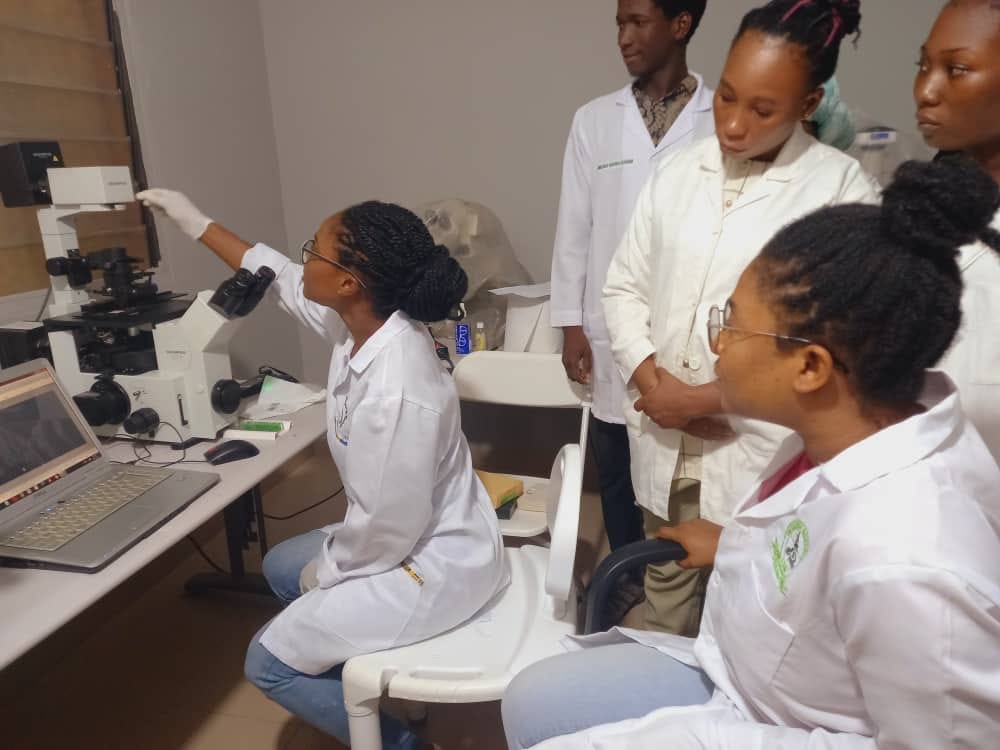
SIT Launches First Undergraduate Internship Program
Empowering the Next Generation of Scientists in Ghana
July 2024 – The Sena Institute of Technology (SIT) is proud to announce the successful launch of its first undergraduate internship program, welcoming an enthusiastic cohort of students eager to explore careers in science, biotechnology, and research.
This pioneering initiative is designed to offer hands-on training, mentorship, and real-world lab experience to students from universities across Ghana, with a focus on preparing them for impactful careers in the life sciences.
Learning Through Practice
Interns are engaged in a wide range of projects including:
- Field research: Documenting local plant and marine biodiversity for conservation.
- Molecular biology and lab work: Exploring genetic tools, microscopy, and DNA barcoding.
- Public health research: Contributing to studies on fibroid prevalence and cell line development.
- STEM education support: Assisting with training programs for high school and undergraduate students.
Building Skills for the Future
Under the guidance of SIT’s research faculty and visiting scientists, the interns are learning to apply emerging biotechnologies to solve real-world problems while gaining exposure to academic and entrepreneurial pathways in science.
“This program is not just about lab techniques—it’s about mentorship, innovation, and cultivating a passion for discovery,” said Mr. Michael Agbleke, Director of SIT.
A Vision for Talent Development in Africa
SIT’s internship program reflects its broader mission to make Penyi a biotechnology hub in West Africa by investing in the next generation of African scientists. By providing opportunities for early-career researchers, the institute aims to build a vibrant ecosystem for scientific inquiry and biotechnological innovation on the continent.
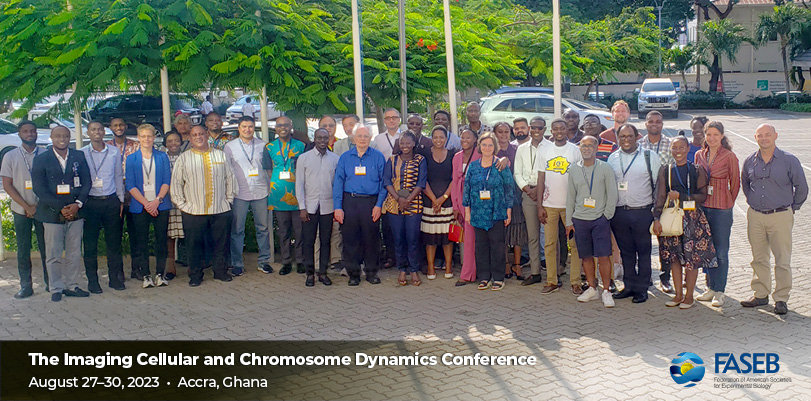
SIT Hosts the First FASEB Conference in Africa — A Landmark for Scientific Exchange in Ghana
The Sena Institute of Technology (SIT) proudly hosted the first Federation of American Societies for Experimental Biology (FASEB) conference on African soil, marking a historic moment in global scientific collaboration.
Held in Ghana, the event convened researchers in bioimaging, genetics, and molecular biology from around the world to foster knowledge exchange, professional networking, and future collaborations across borders.
A Truly Global Gathering
Participants hailed from diverse regions including:
- United States
- Europe (France, Belgium, Switzerland)
- Asia (Japan)
- West Africa (Ghana, Nigeria, The Gambia)
This rich blend of expertise created an inclusive environment where early-career scientists engaged with established researchers to discuss breakthroughs in genetic research, imaging technologies, and biotechnology innovations tailored for Africa.
Impact and Feedback
A post-event survey revealed:
- Average conference rating: 4.2 out of 5
- 70% of attendees expressed satisfaction with the planning and execution
- Strong interest in a follow-up event in 2025
“This conference has shown the world that Africa is ready to be at the center of global biotech dialogue,” said Dr. Kwasi Agbleke, SIT President and host of the conference.
Looking Ahead
The success of this inaugural FASEB event in Africa has catalyzed:
- Plans for a second conference in 2026
- Increased demand for regional scientific gatherings
- New collaborative initiatives in training, joint research, and funding mobilization
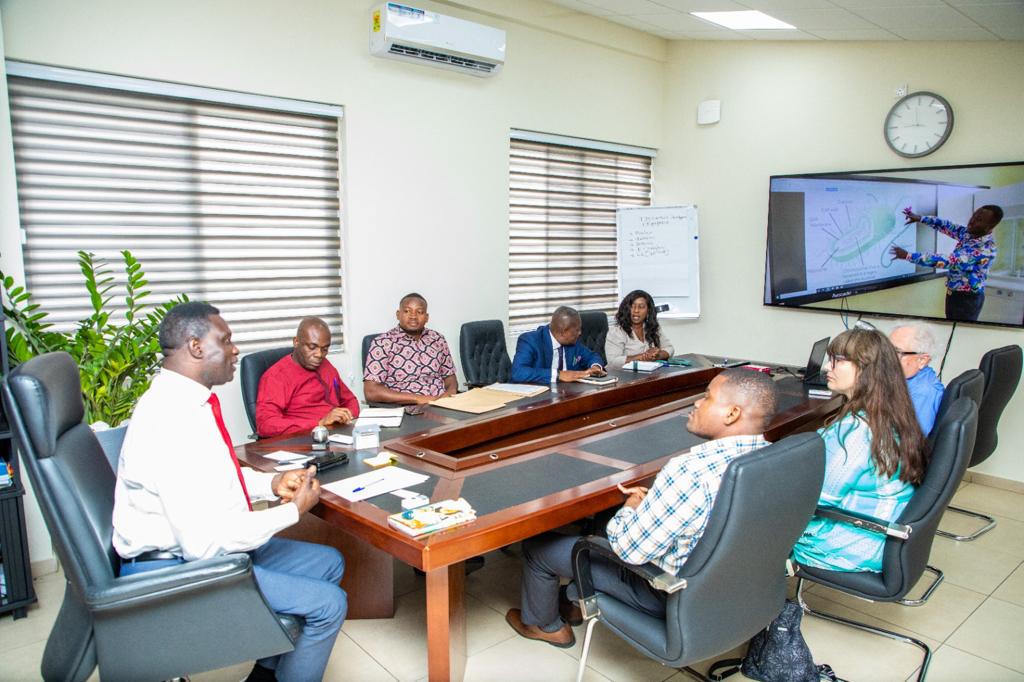
Dr. Tom Broker Visits SIT and Ghana’s Ministry of Education
The Sena Institute of Technology (SIT) was honored to welcome Dr. Tom Broker, a renowned molecular biologist and global science advocate, during his recent visit to Ghana. Dr. Broker’s tour included a courtesy visit to Dr. Yaw Osei Adutwum, Ghana’s Minister of Education, and Mr. Anthony Avorgbedor, Ketu North Municipal Chief Executive.
Focus on Education as a Driver of Innovation
In his discussions, Dr. Broker emphasized the critical role of education—particularly science and technology—in advancing national development. He underscored the importance of practical, research-oriented learning environments and international collaboration to equip students with the tools needed to drive innovation and solve Africa’s most pressing challenges.
Government Support for STEM Education
Dr. Adutwum, a long-time proponent of STEM education reform in Ghana, shared the Ministry’s commitment to expanding and strengthening science, technology, engineering, and mathematics programs across the country. He emphasized the need for stronger links between academic training and industry-relevant skills, aligning well with SIT’s mission of hands-on, research-based education.
Mr. Avorgbedor, Municipal Chief Executive of Ketu North, expressed his full support for SIT’s expansion in the Volta Region and praised its role in building capacity among youth in biotechnology and environmental sciences.
Bridging Global Expertise with Local Impact
Dr. Broker’s visit highlights SIT’s growing network of international collaborators and its efforts to position Ghana as a hub for scientific research and STEM innovation. The institute remains committed to nurturing talent, fostering innovation, and building partnerships that translate science into solutions for local and continental challenges.
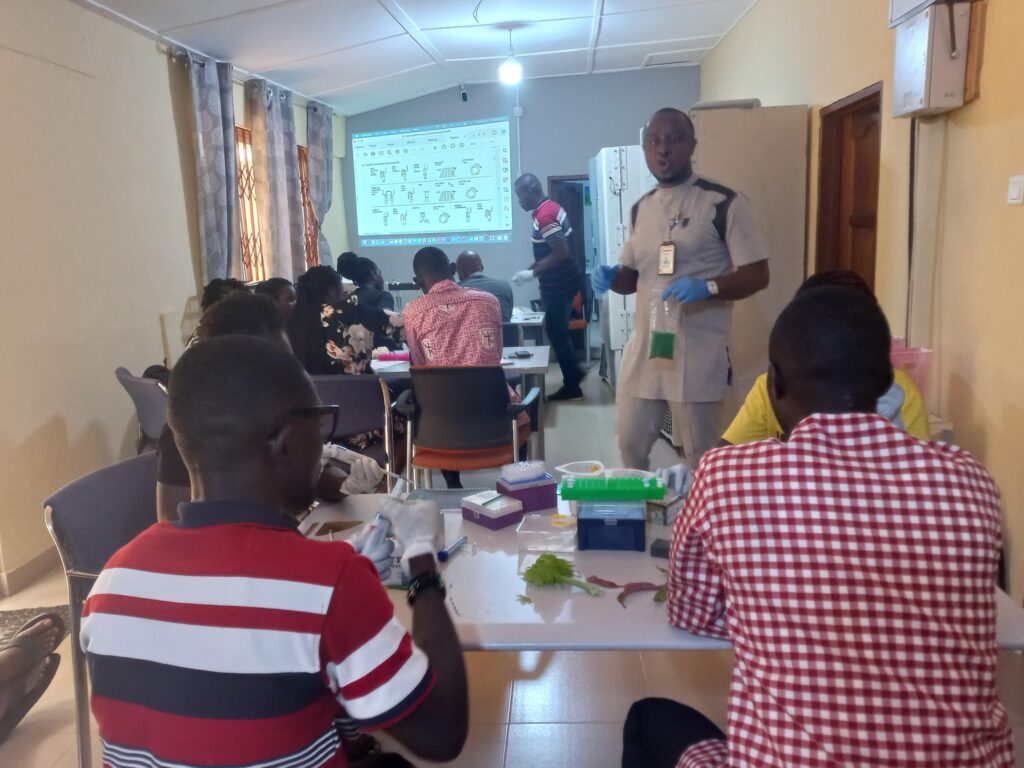
Sena Institute Launches National Service Program to Build Ghana’s Future Biotech Leaders
As part of our vision to transform Penyi into a regional biotechnology hub, the Sena Institute of Technology (SIT) is proud to announce the recruitment of its first cohort of National Service staff in 2023.
This exciting milestone marks a significant investment in capacity-building, local talent development, and the future of African-led biotechnology research.
“Our national service program is more than training — it’s about empowering young scientists to solve real-world problems using science,” said Dr. Kwasi Agbleke, President of SIT.
Interns Will Support Key Research & Outreach Projects:
1. Field Research in Biodiversity
Interns will help document native plant and marine organisms across Ghana’s ecosystems to support conservation biology and genetic research.
2. Molecular Biology and Microscopy
Trainees will use genetic tools and microscopy to explore cell structure, gene expression, and microbial interactions in our modern wet lab environment.
3. Fibroid Genetics & Cell Line Development
Staff will assist in fibroid prevalence surveys, sample collection, and the development of patient-derived organoid models for advanced genomic studies.
4. STEM Training and Outreach
Interns will participate in hands-on training sessions for senior high school and undergraduate students, building the next generation of scientists through education and mentorship.
Why It Matters:
This national service initiative strengthens SIT’s commitment to:
- Training a skilled biotech workforce
- Promoting community-led science
- Creating job pathways in STEM fields
- Establishing Penyi as a biotechnology innovation hub
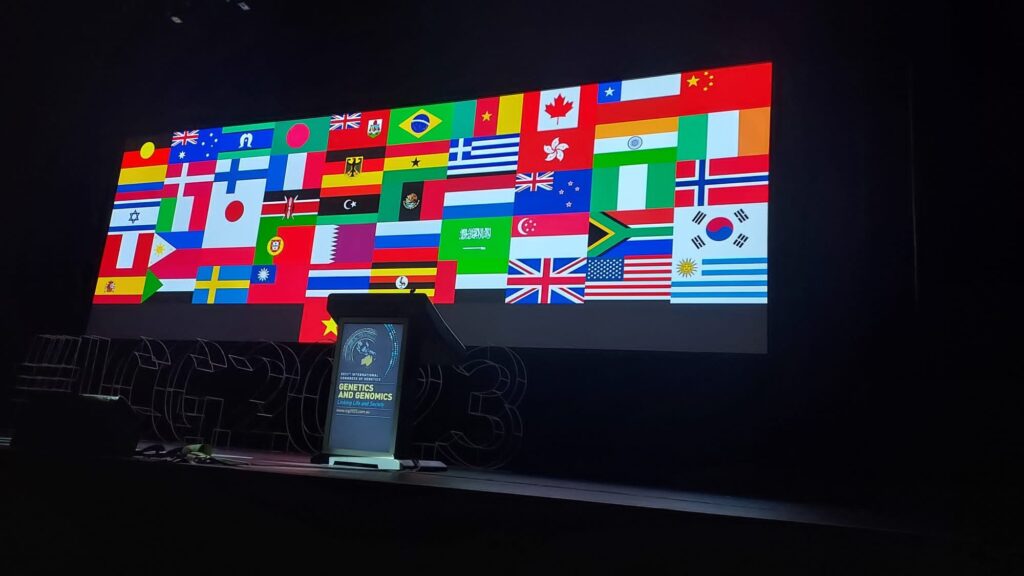
Dr. Kwasi Agbleke Represents West Africa at International Congress of Genetics
Championing African Genetic Innovation on the Global Stage
Melbourne, Australia (July 2023) – At the prestigious International Congress of Genetics (ICG), held this year in Melbourne, Dr. Kwasi Agbleke, President of the Sena Institute of Technology, proudly represented the Genetics Society of West Africa as its Founding President.
In a powerful presentation to global geneticists, Dr. Agbleke emphasized the vital role that regional professional societies play in advancing scientific innovation and fostering collaboration across borders.
“Africa must lead in building research capacity and developing homegrown solutions. Professional societies are critical platforms for mentorship, partnerships, and scientific progress,”
— Dr. Kwasi Agbleke
The Genetics Society of West Africa: A Growing Voice
Dr. Agbleke shared the vision and progress of the newly launched Genetics Society of West Africa (GSWA)—a regional organization dedicated to:
- Fostering collaboration among geneticists, biotechnologists, and researchers across West Africa
- Supporting early-career scientists through mentorship, training, and research funding
- Promoting genetic literacy and public engagement in science and health
- Creating platforms for policy dialogue on genomics, biodiversity, and public health
Global Recognition for African Leadership
Dr. Agbleke’s presence at ICG marked an important moment for African scientific representation in the global genetics community. The Congress brought together thousands of experts from across continents to discuss cutting-edge research in genomics, bioinformatics, agricultural genetics, and more.
The Genetics Society of West Africa’s leadership was applauded for its ambitious vision and efforts to create a regional ecosystem of excellence in genetics.

We thank the Burroughs Wellcome Fund for their generous support for the 2023 FASEB conference on theme “Imaging Cellular and Chromosome Dynamics” scheduled for August 27- September 1, 2023 in Ghana.

Sena Institute Receives IRB Approval to Study Fibroid Genetics in Ghana
We are proud to announce that the Sena Institute of Technology (SIT) has received its first Institutional Review Board (IRB) approval from the Ghana Health Service Ethics Review Committee to launch a groundbreaking study on the molecular genetics of fibroids among Ghanaian women.
This milestone marks a critical step in addressing one of the most prevalent yet under-researched health issues affecting women across the country.
“This research will help unravel the genetic and societal burden of fibroids, while informing better healthcare strategies for women,” said Mr. Michael Agbleke, President of SIT.
Study Focus:
The project will investigate:
- The genetic profile of fibroids by growing fibroid-derived organoids in the lab
- The prevalence of fibroids across multiple regions in Ghana
- The impact of fibroids on women’s lives through qualitative assessments
- The burden on Ghana’s health system, including economic and social factors
Collaborating for Impact
This pioneering research is being conducted in collaboration with:
- Fibroid Foundation Africa, advocating for awareness and patient-centered research
- The University of Chicago Department of Obstetrics and Gynecology, contributing clinical and genomic expertise
Together, these institutions will apply a multifaceted approach—combining lab science, field surveys, and patient interviews—to create a holistic understanding of fibroid disease in Ghana.
Advancing Women’s Health Research in Africa
By integrating molecular diagnostics, biobanking, and community-based research, this project aims to:
- Identify biomarkers for early detection
- Contribute to the development of targeted therapies
- Support policy recommendations for national women’s health initiatives

SIT Goes Solar! 20kVA Solar Power System Now Operational at Penyi Campus
We are thrilled to announce that the Sena Institute of Technology (SIT) has successfully completed the installation of a 20kVA solar power system at our research campus in Penyi, Ghana.
This milestone marks a major step in sustainable infrastructure development at SIT, empowering our researchers with reliable, clean energy while reducing dependence on the national hydroelectric grid.
Powering Scientific Innovation
With this new system in place, SIT now benefits from:
- Stable electricity supply for critical research equipment and cold storage
- Reduced carbon footprint, supporting environmental stewardship
- Greater capacity to pursue long-term experiments without interruption
- Energy independence—especially important during Ghana’s dry season when grid reliability is often challenged
“This solar project is not just about energy—it’s about empowering research, innovation, and resilience,” said Dr. Kwasi Agbleke, President of SIT.
Gratitude to Our Donors and Champions
We are especially honored to recognize Dr. Rich Roberts, 1993 Nobel Laureate in Physiology or Medicine and Chief Scientific Officer at New England Biolabs, as a major donor and champion of this project. Dr. Roberts’ unwavering support for expanding access to biotechnology in Africa continues to inspire our mission and vision.
We also thank the broader community of donors, technical partners, and supporters who helped bring this project to life. Your contributions are powering the future of African science.
What’s Next?
This solar milestone strengthens SIT’s foundation as a hub for:
- Advanced biotech R&D
- Hands-on STEM education
- Climate-resilient scientific infrastructure
We look forward to expanding this initiative with additional renewable energy solutions and smart lab facilities in the near future.
SIT takes delivery of a Biosafety Cabinet
Today we are closer to our goal of generating the first African/Ghanaian Fibroid cell line, conducting gene editing research and generating DNA for genome sequencing at the Sena Institute of Technology Ghana. With the Sterigard III Advance biosafety cabinet installed and calibrated, we can start derivation of human, mammalian, yeast and plant cells and tissues at our molecular biology lab.
We thank Harvard University for donating the cabinet.

International Fellowship and Fibroid Research in Ghana
This summer, we welcome Global Health Fellows from University of Chicago at the institute. The fibroid project is in partnership with Dr. Ayman Al Hendy, University of Chicago Obstetrics and Gynecology Department and Fibroid Foundation Africa. Through this partnership we will document the prevalence of fibroid across Africa especially within Ghana and generate an African fibroid cell line. We thank Ms. Lillian Prince, Ms. Thembi Ndebele and Ms. Narvella Sefah and staff of the Fibroid Foundation Africa especially Ms. Liz Korasare.
This project is supported by the Burroughs Wellcome Fund grant for graduate and postdoctoral fellowships in Ghana.

June 2022: Sena Aquatic Life Conservation Project
The Sena Aquatic life conservation project kicked off with marine life documentation across Ghana Coastline from Denu in the Volta Region through Ada and Prampram (Greater Accra Region) to Cape Coast (Central Region).
This project’s goal is to sequence hundreds of marine organisms and is in partnership with the Ocean Genome Legacy, Northeastern University.

May 2022: SIT celebrates its first training program
We thank Togbuiga Dadzi V, Paramount Chief of Penyi; Togbui Ekle II, Chief of Hatta; Togbui Axorlu II, Chief of Atsiagorme; elders; Hon. Charlotte Dordunoo, assemblywoman; Rev. Fr. Selasi Amegashitsi; representatives of the municipal assembly; and parents for their immense support for the Senior High School students who completed the Junior Training Program at Sena Institute of Technology at Penyi. It is indeed a pleasure to hear from our Paramount Chief words of advice for the students. It is encouraging to see a united Penyi working to give hope to the next generation, Volta Region and Ghana.
The students went through a 1-month intensive training in microscopy, plant database management and molecular biology where they extracted DNA from fruits.


April 2022:
SIT renews its Conservation, Food and Health Grant
SIT renews its grants to documents plants in Ghana and their applications for food, therapy and supplements.

March 2022: SIT receives epifluorescence Microscopes
SIT takes delivery of two widefield microscopes for transmitted and reflected microscopy. The donation is to support the microscopy core facility.

January 2022: SIT takes delivery of an RT-PCR machine
As part of our effort to conduct Covid19 testing in the Penyi-Dzodze area, we received the Strategene Mx3005 RT-PCR machine. The set-up is now available for use in the molecular biology laboratory and for researchers across the country.

Sena Institute of Technology receives a $25,000 grant from Conservation, Food and Health Foundation.
Sena Institute of Technology Foundation receives a $25,000 to develop a Ghanaian crop database and biospecimen repository to help conserve medicinal and food plants.
SIT receives a $100,000 grant from the New England Biolabs
SIT receives a grant from New England Biolabs. We are grateful for the grant which will enable us expand our research into plants and develop capacity to promote local research and technology development.
For more about the award here.
SIT Foundation received a $25,000 grant from Burroughs Wellcome Fund
The grants supports our entrepreneurial exchange experience for international graduate and postdoctoral fellows to visit Ghana.
